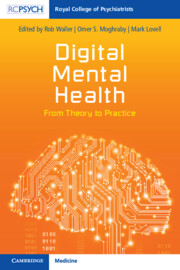Book contents
- Digital Mental Health
- Digital Mental Health
- Copyright page
- Contents
- Contributors
- Introduction
- Chapter 1 Working with IT Systems
- Chapter 2 Technology-Enabled Care
- Chapter 3 Note Keeping in the Digital Age
- Chapter 4 Big Data
- Chapter 5 Artificial Intelligence
- Chapter 6 Digital Clinicians
- Chapter 7 Global Telepsychiatry
- Chapter 8 The Integration Agenda
- Chapter 9 Digital Wellbeing
- Chapter 10 Conclusion
- Appendix: Abbreviations
- Index
- References
Chapter 4 - Big Data
The New Epidemiology
Published online by Cambridge University Press: 23 November 2023
- Digital Mental Health
- Digital Mental Health
- Copyright page
- Contents
- Contributors
- Introduction
- Chapter 1 Working with IT Systems
- Chapter 2 Technology-Enabled Care
- Chapter 3 Note Keeping in the Digital Age
- Chapter 4 Big Data
- Chapter 5 Artificial Intelligence
- Chapter 6 Digital Clinicians
- Chapter 7 Global Telepsychiatry
- Chapter 8 The Integration Agenda
- Chapter 9 Digital Wellbeing
- Chapter 10 Conclusion
- Appendix: Abbreviations
- Index
- References
Summary
As the use of big data in psychiatry continues to expand, it is crucial to involve patients and the public in decisions about its development and application. Mental Health Data Science Scotland has co-produced a best practice checklist involving both researchers and people with lived experience. This guidance emphasises the need for data to be securely accessible and carefully anonymised and for processes and analyses to be transparent, with participants or patients prioritised throughout.
- Type
- Chapter
- Information
- Digital Mental HealthFrom Theory to Practice, pp. 50 - 59Publisher: Cambridge University PressPrint publication year: 2023



